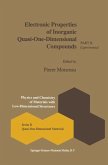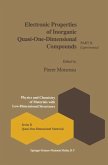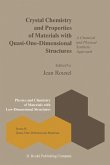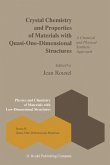The close relationship between experimentalists and theorists - whether solid state chemists or physicists - has, in the last few years, inspired much research in the field of materials with quasi one-dimensional structures.
Part I of this two-volume set, reviews the basic theories describing the physical properties of one-dimensional materials including their superconducting characteristics. This description is mainly based on the properties of transition metal trichalcogenides. The novel collective transport mechanism for electronic conduction, exhibited by some of the latter compounds - NbSe3 being considered as the prototype - is surveyed according to a classical theory and a theory including macroscopic quantum effects. In addition, the book contains a description of the properties of non-linear excitations, or solitons, in one-dimensional systems.
Part II of this two-volume set deals with the experimental treatment of pseudo-one-dimensional conductors. Included are contributions on platinum chains, (SN)x and (SNBry)x, the optical properties of 1-D inorganic metals, CDW transport in transition metal chalcogenides, and a lattice dynamical study of transition metal trichalcogenides.
Hinweis: Dieser Artikel kann nur an eine deutsche Lieferadresse ausgeliefert werden.
Part I of this two-volume set, reviews the basic theories describing the physical properties of one-dimensional materials including their superconducting characteristics. This description is mainly based on the properties of transition metal trichalcogenides. The novel collective transport mechanism for electronic conduction, exhibited by some of the latter compounds - NbSe3 being considered as the prototype - is surveyed according to a classical theory and a theory including macroscopic quantum effects. In addition, the book contains a description of the properties of non-linear excitations, or solitons, in one-dimensional systems.
Part II of this two-volume set deals with the experimental treatment of pseudo-one-dimensional conductors. Included are contributions on platinum chains, (SN)x and (SNBry)x, the optical properties of 1-D inorganic metals, CDW transport in transition metal chalcogenides, and a lattice dynamical study of transition metal trichalcogenides.
Hinweis: Dieser Artikel kann nur an eine deutsche Lieferadresse ausgeliefert werden.







